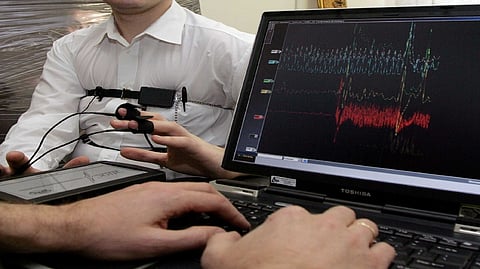

CHENNAI: The polygraph test or lie detector test has once again hit the news after several years. It was due to the two different murder cases where the suspects were to be put under this method of investigation. One is Minister KN Nehru’s brother KN Ramajeyam’s murder case that occurred in 2009 and another is the cold-blooded murder of a woman by her living partner in Delhi.
In the case of Ramajeyam, a Magistrate Court had granted permission to the SIT headed by Thoothukudi SP Jeyakumar to conduct the polygraph test on 12 out of 13 suspects namely Sami Ravi alias Ravikumar, Senthil Kumar, Mohanram, Dinesh Kumar, Naraimudi Ganesan, Sathyaraj, Kalaivanan, Marimuthu, Dileep alias Lakshmi Narayanan, Rajkumar, Surendar and Siva alias Gunasekaran.
In the New Delhi woman’s murder, the police accorded permission for the polygraph test on the accused Aaftab Amin. Speaking about the polygraph tests, criminal lawyer S Zahir Hussian said that when the police are unable to dig out the evidence or they are not in a position to solve the cases, they would prefer filing a petition under 311 A of the Criminal Procedure Code (CrPc) before the magistrate court for conducting the polygraph test on the suspects.
“Though there are so many cases, the most noted one is the murder case of Kerala nun Sister Abhaya. Though she was murdered in 1992, the case was cracked in 2008 only after conducting the Narco-Analysis Test on the priest and another nun. Since the victim saw the duo in a compromising position in the nun’s hostel, they eliminated her without evidence. After 16 years, the case was cracked by a DSP Nandakumar Nair since he got permission from the court to conduct the polygraph test,” the advocate told DT Next.
He further noted that the suspects have the right to deny consent to undergo the test under Articles 21, 20 (3), and 23 of the Constitution. However, it is up to the prosecution side that has to flawlessly prove that there is no other evidence in the case and the suspects are rightly related to the crime.
Advocate PVS Giridharan said that though the polygraph test is the last hope to crack a case, the courts would not endorse the report of prosecution at all times. “The efficiency of the prosecuting agency and the suspect’s statements should convince the court of law to accept the test,” he added.
Visit news.dtnext.in to explore our interactive epaper!
Download the DT Next app for more exciting features!
Click here for iOS
Click here for Android